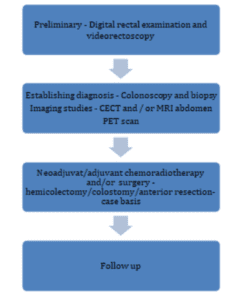
When it comes to your health, knowledge is power. Understanding colon cancer symptoms is the first step toward a proactive approach to your well-being.
Colon cancer, also known as colorectal cancer, is a severe medical condition that requires awareness and timely intervention. Recognizing Colon Cancer Symptoms is crucial for early detection and effective treatment.
What Are Some Early Signs Of Colon Cancer Symptoms?
It’s important to remember that many people with colon cancer don’t experience any symptoms, especially in the early stages. Regular screening is crucial for early detection, even if you feel fine.
However, some potential early signs of colon cancer symptoms to be aware of include:
Persistent Changes in Bowel Habits:
- A noticeable shift in your bowel habits is one of the foremost signs that merit attention. If you experience alternating episodes of diarrhea and constipation you must delve deeper into the potential causes.
- Tenesmus: It primarily refers to a continual urge to defecate, with the bowels feeling like they haven’t emptied after a bowel movement. This symptom can be particularly uncomfortable. This is a very important early symptom and warrants investigation
- Spurious diarrhoea: It is the feeling of evacuating bowels several times a day.
- Early morning bloody diarrhoea.
Blood in Stool:
The presence of blood in the stool is a significant warning sign and should not be ignored. This can manifest as:
- Visible blood: Bright red blood on the surface of the stool, can be a sign of bleeding in the lower colon or rectum.
- Dark blood or tar-coloured stools: This indicates bleeding from higher up in the colon or the small intestine.
Anaemia:
Caused by a decrease in red blood cells, anaemia in colon cancer can be due to hidden bleeding in the colon. Symptoms of anaemia include pale skin, dizziness, shortness of breath, and rapid heartbeat.
Unexplained Weight Loss:
While shedding a few pounds may be a personal goal for many, unintended and unexplained weight loss can be a warning sign. If you lose weight without trying, it’s crucial to investigate the underlying reasons.
Loss of appetite:
A decrease in the desire to eat is not uncommon in various types of cancer, including colon cancer. Loss of appetite can be due to several factors:
-
Metabolic changes
Cancer can cause metabolic changes that decrease hunger.
-
Obstruction
A tumour may physically obstruct part of the digestive tract, affecting digestion and causing discomfort or pain that discourages eating.
-
Systemic effects
General inflammation and the body’s immune response to cancer can reduce appetite.
Fatiguability:
Fatigue that lingers despite adequate rest can be an early indication of colon cancer. This persistent tiredness may result from the body’s response to the cancerous growth.
Symptoms in advanced stages:
-
Pain and abdominal distention
The tumour blockage can cause a build-up of gas, fluid, and stool, leading to painful swelling and bloating of the abdomen.
-
Obstipation
This refers to severe constipation where an individual cannot pass stool or gas. It’s a direct result of the obstruction in the colon.
-
Colovaginal / Colovesical Fistulae
These are abnormal connections that form between the colon and the vagina or bladder, respectively, due to the erosion caused by the tumour. These conditions are particularly distressing
What Are Some Causes Of Colorectal Cancer?
Here are some Risk Factors that are implicated in causing colorectal cancer:
Genetic:
- One of the primary catalysts behind rectal cancer lies in our genetic makeup. Individuals with a family history of colorectal issues may find themselves at an increased risk. Understanding the genetic threads that weave this intricate tapestry is crucial in comprehending the roots of rectal cancer.
- Certain familial cancer syndromes are associated with colorectal cancer – FAP, HNPCC
Lifestyle Factors:
Our daily choices and habits wield significant influence over our well-being. Low fibre high-fat diet and sedentary lifestyles, coupled with poor dietary choices, emerge as potential contributors to rectal cancer. Increased risk of colorectal cancer has also been associated with Animal fat, smoking, and alcohol.
Intestinal pathologies – Inflammatory Bowel Diseases:
Inflammation, when chronic, can set the stage for various health complications, including rectal cancer. Conditions like Crohn’s disease and ulcerative colitis, characterized by persistent inflammation in the gastrointestinal tract, heighten the susceptibility to this formidable ailment.
Age as a Factor:
The ticking clock plays a crucial role in the development of rectal cancer. Advancing age becomes a pivotal factor, with individuals over 50 facing an elevated risk. Regular screenings and awareness become paramount as one navigates the sands of time.
Environmental Exposures:
Our surroundings, laden with various elements, can also be implicated in the onset of rectal cancer. Environmental exposures to certain toxins and contaminants may contribute to the development of this condition. Understanding and mitigating these external influences are integral to safeguarding one’s health.
What Are Some Colorectal Cancer Treatments at Chirag Global Hospital?
Colorectal cancer is a formidable adversary, affecting a significant number of individuals globally. At Chirag Global Hospital, we understand the gravity of this condition, and our commitment to providing colorectal cancer treatments is unwavering.
The treatment algorithm for colorectal cancer can be summarised below:

Surgery:
Certain stages of colorectal cancers warrant surgical excision of the tumour. Our team of surgeons with expertise in the same provide surgical services with precision and compassion
Radiation Therapy:
Radiation therapy is a cornerstone in our approach to combatting colorectal cancer. Chirag Global Hospital employs cutting-edge technology to deliver targeted radiation to cancerous cells, minimizing damage to surrounding healthy tissue.
Chemotherapy:
Chemotherapy is a powerful tool in the fight against colorectal cancer, and at Chirag Global Hospital, we utilize the latest advancements in chemotherapy protocols. Our multidisciplinary team customizes treatment plans to suit individual patient needs, ensuring maximum efficacy with minimal side effects.
Hormonal and Biological Therapy:
Our specialists at Chirag Global Hospital leverage the latest advancements in precision medicine to identify specific markers on cancer cells. We can effectively block the signals that fuel cancer growth by tailoring treatment to these markers.
Conclusion
Understanding colon cancer symptoms, recognizing the causes of rectal cancer, and exploring the available treatment options are vital for proactive healthcare. Early detection significantly improves the chances of successful treatment and long-term survival.
At Chirag Global Hospital, we stand united in our mission to provide unparalleled colorectal cancer treatments, embracing innovation, precision, and compassion to unlock the pathway to hope for our patients.
If you or a loved one is facing colorectal cancer, trust Chirag Global Hospital for unparalleled expertise and compassionate care.
Book an appointment now and get colon cancer treatment from the best.

